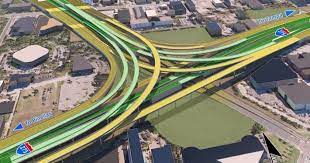A group of business executives from Tampa Bay in Florida has come together to request legislators to help encourage the state with the refunding of the US$1.4 billion Westshore Interchange project, a project that would help ease up one of the worst traffic bottlenecks in the region but is expected to be delayed. The Tampa Bay Partnership garnered support from 45 well-known Tampa Bay executives and sent a letter at the beginning of the month to Florida House of Representatives Speaker Chris Sprowls, Senate President Wilton Simpson, and Senate Appropriations Chair Kelli Stargel to communicate the critical need to not delay the project and to restore funds.
Also Read: San Mateo Transportation Authority grants city US$23.8m for road project
The US$1.4 billion reconfigurations of the Westshore Interchange has been looked forward to for a while by businesses and residents as the Westshore Business District is the largest employment center in the Tampa Bay area. It is home to Tampa International Airport, sports facilities, and over 4,000 businesses. The project is envisioned to provide better access to the airport and Pinellas County. In 2019, Florida granted US$1.4 billion for the project after many executives supported the initial ask for the funds since 2018. However, the funding for the project was cut due to the pandemic’s economic impact on the state’s budget. The project has been pushed out for two years.
The project was expected to start in 2024, which coincides with the completion of the new span of the Howard Frankland Bridge and the six lanes of traffic that will be coming into Hillsborough County. “The Westshore Interchange project is already long overdue, and the current configuration of roadways already creates the most severe traffic congestion in the region. A further delay, considering the bridge construction and the expected population growth, is unacceptable. With the delayed start, and the scheduled completion pushed back to 2030, the region will suffer from huge transportation delays and dangerous bottlenecks that negatively impact commuters and commerce, including passenger and freight access to Tampa International Airport” the letter read.

